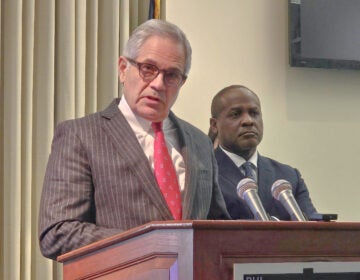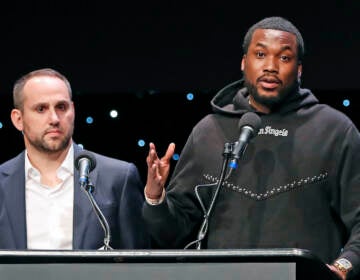Freed but still fighting, Philly convict gets an unexpected ally in his bid for exoneration
The prosecutor who put Kevin Brinkley in prison apologizes to the former "juvenile lifer." Brinkley family says it will fight for exoneration.

Kevin Brinkley (left) listens to an apology from attorney Gerald Dugan, who 40 years ago prosecuted the murder case that got Brinkley a life sentence. Dugan has since changed his mind about Brinkley's role in the murder of Charles Haag. (Emma Lee/WHYY)
A week ago, Kevin Brinkley walked out of prison a free man — after 40 years behind bars.
Thursday, he did something unexpected: He shook hands with the prosecutor who put him there.
“I really am sorry,” Gerald Dugan told Brinkley, who nodded slightly.
“You have every right to tell me that you hate me,” added Dugan, who’s now in private practice. “I’m not going to sugarcoat it: You and I know [the jurors] sentenced you to life in prison because I told them to do it.”
It seemed a surreal moment in a four-decade odyssey for the Brinkley family, who had — from the very beginning — insisted that police arrested the wrong person in the 1977 murder of dairy deliveryman Charles Haag. But, unlike others who swear innocence, the Brinkley family offered authorities a heart-rending alternative: They said Kevin’s little brother Ronnie, then 14, killed Haag during a botched robbery.
But police and prosecutors never bought it, even accusing the family of “scheming” in order to land a lighter sentence for the younger boy. A jury convicted Kevin, then 15, dooming him to life behind bars without parole, the state’s automatic minimum sentence for a murder conviction.
Then, in 2012, the U.S. Supreme Court banned mandatory life-without-parole sentences for minors as “cruel and unusual punishment,” giving hope to thousands of juvenile lifers — including about 500 in Philly — that they might someday be released. At least 165 juvenile lifers have been resentenced, and 82 released, since then, according to the state Department of Corrections.
In June, a judge resentenced Brinkley, now 55, to 30 years to life. Authorities later approved him for parole, and, on Oct. 19, guards freed him from the State Correctional Institution at Forest, about 100 miles northeast of Pittsburgh.
Troy Brinkley, Kevin’s cousin, said: “What’s that saying about ‘brother’s keeper?’ Kevin has been his brother’s keeper.”
Brinkley now lives with an aunt and uncle in Olney and has spent the past week getting reacquainted with his family, which includes a grown daughter who was just an infant when he went to prison, as well as two grandchildren.
Still, Brinkley’s family said their fight is far from over.
‘We’re never going to stop fighting for his innocence’
Under the terms of his release, Brinkley will remain on parole for the rest of his life — meaning any infraction, even something as slight as jaywalking, could land him back behind bars.
Parole, his uncle Greg Brinkley said, is “second-worst to prison.” Besides, he added, why should he be on parole for a murder he didn’t commit?
So Greg Brinkley said his family will fight for a full exoneration.
“Kevin’s paid 40 years for that crime. And the tragedy that we have experienced as a family, you have no idea. All of us. The Brinkley family. It’s just not fair, it’s just not fair,” he said, growing emotional during Thursday’s meeting at Dugan’s Center City law firm. “We’re never going to stop fighting for his innocence. We’re not going to do it.”
The Philadelphia district attorney’s office has repeatedly refused to review the conviction, saying police got the correct killer. Spokesman Cameron Kline issued this statement Thursday:
“Based on the evidence presented at trial, as well as evidence that was presented at hearings in Kevin Brinkley’s various post-conviction proceedings, the district attorney’s office has been and remains confident in the conviction. Two eyewitnesses who had known Kevin Brinkley for several years identified him as the person who shot and killed Charles Haag. Trial evidence presented by Kevin that these eyewitnesses mistook him for his 14-year-old brother Ronald was rejected by the jury. It should be noted that Ronald and Kevin do not resemble each other and, hence, are not easily confused.
In extensive, separate post-conviction relief hearings, this same claim was rejected by two different Common Pleas Court judges.
Finally, the Superior Court of Pennsylvania, in its 2009 opinion denying Kevin’s claim, said: ‘… we admonish Brinkley for wasting the court’s time by continuing to allege that it was his brother who committed the crime no matter how often the trial court, PCRA court and this Court hold that this claim is meritless.’ ”
Brinkley’s family has offered both brothers up for polygraph tests. They’ve also enlisted the Pennsylvania Innocence Project and the Philadelphia chapter of the NAACP to help in their exoneration efforts. Activist Pam Africa accompanied the family to Dugan’s office Thursday.
“We seen it as a tragedy 40 years ago,” Africa said. “So much has been robbed from this family. And I’m going to work 100 percent in order to see that he’s completely exonerated, and that this family gets justice, each and every last one of them, for what they’ve gone through for 40 years.
“I really want to thank Mr. Dugan for being responsible enough to come forth now and take a manly stand about an injustice that was just 100 percent wrong. I know for a fact he’s going to feel the weight of being an honest person, of standing up. Irregardless of that, he’s standing up anyway.”
Lingering doubts prompt prosecutor’s turnaround
The family hopes Dugan’s change of heart will persuade the next district attorney — whether that’s Democrat Larry Krasner or Republican Beth Grossman — to review Brinkley’s conviction and help get it overturned.
Dugan reached out to Brinkley’s family in August to alert them to his concerns about the case.
He didn’t say what changed his mind since the trial 40 years ago, other than admitting that “lingering doubts” nagged him more and more over the years. And after one of two eyewitnesses recanted and Dugan read and reread the trial transcripts and deemed Brinkley’s defense attorney “borderline incompetent,” he decided to write a letter to the Pennsylvania Board of Probation and Parole supporting his bid for freedom.
“In spite of the fact that I believed then, as I believe now, that I did absolutely nothing unethical or inappropriate during the prosecution of that case, it has weighed heavily on my mind for the past 40 years,” Dugan wrote. “I am nearly 70 years old and in the process of winding down my legal career. Before I retire however, I thought it was essential to address the conviction of Kevin Brinkley because of my lingering doubts, both then and now, about his guilt.”
Thursday, Dugan told Brinkley, “I can’t expect you to accept my apology. As long as you heard it. I only ask that you heard it.”
Kevin Brinkley, a man known for his reticence, sat still and, after a beat, mumbled a reply only he could hear.
Dugan Letter on Kevin Brinkley (Text)
Editor’s note: an earlier version of this story erroneously stated that the number of juvenile lifers in Philly. The story has been changed to reflect the correct number. We regret the error.
WHYY is your source for fact-based, in-depth journalism and information. As a nonprofit organization, we rely on financial support from readers like you. Please give today.




